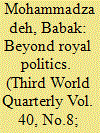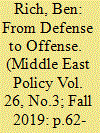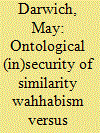| Srl | Item |
| 1 |
ID:
167695


|
|
|
|
|
| Summary/Abstract |
Saudi politics is commonly portrayed as reflecting a system of centralised personal rule in which decision-making power trickles down from the tightly knit power circles within the House of Saud. In contrast, this paper draws attention to the empowerment of quasi-autonomous state organisations in Saudi Arabia as a result of state transformation and regional integration. At its most extreme, state transformation in Saudi Arabia has created institutional and regulatory enclaves with vested interests and areas of competence that cross Saudi borders. This paper illustrates the foreign policy ramifications of transformed statehood in Saudi attempts to further Gulf regional integration in the context of the Gulf Monetary Union project.
|
|
|
|
|
|
|
|
|
|
|
|
|
|
|
|
| 2 |
ID:
169604


|
|
|
|
|
| Summary/Abstract |
Since the 2015 ascension of King Salman bin Abdulaziz, the Saudi state has displayed growing discontinuity with trends in its pursuit of national security. Over the past four years, the kingdom has shifted from being a source of comparative stability and continuity in the Persian Gulf security equation to a disposition that is disruptive to that system. Having initiated a series of destabilizing crises throughout the Middle East, the Saudi pursuit of external security appears no longer defined by the predictability that has been its hallmark since its inception. Instead, it appears increasingly characterized by unpredictable aggressiveness. As one veteran Saudi analyst has argued, anticipating the kingdom's next foreign‐policy move has become more challenging than Soviet watching during the height of the Cold War.
|
|
|
|
|
|
|
|
|
|
|
|
|
|
|
|
| 3 |
ID:
118317


|
|
|
|
|
| Publication |
2013.
|
| Summary/Abstract |
Saudi Arabia has positioned itself among the primary mediators in some of the Middle East's most intractable conflicts, having played central mediatory roles in Lebanon, Palestine, and in Arab-Israeli conflict. Compared with the mediation efforts of another frequent regional mediator, namely Qatar, Saudi mediation initiatives tend to be more institutionally grounded and are less personal in nature, and often involve less fanfare and are more discreet. At the same time, the Kingdom is not always readily identified with its satellite media network of Al Arabiya in the same way that Qatari foreign policy is perceived to be closely aligned with Al Jazeera coverage. Although such efforts have seldom resulted in successful resolution of conflicts among the disputants involved, the Kingdom has used mediation to successfully further its twin objectives of ensuring and furthering state and regime security, while also playing a central coordinating role in regional affairs. As such, Saudi Arabia is likely to continue to play a similar mediatory role in the foreseeable future.
|
|
|
|
|
|
|
|
|
|
|
|
|
|
|
|
| 4 |
ID:
146349


|
|
|
|
|
| Summary/Abstract |
It has long been argued that identity matters in international relations. Yet how identity impacts enmity and conflict among states remains the subject of debate. The existing literature asserts that differences in identity can be a source of conflict, whereas convergence and similarity lead to cooperation. Nevertheless, empirical evidence from the Middle East has long defied this hypothesis. The Kingdom of Saudi Arabia, which prides itself on being an Islamic model and claims Islamic leadership, has opposed the rise to power of Islamist movements in the Middle East. To address this paradox, this article builds on the growing literature on ontological security to propose a theoretical framework explaining how similarity can generate anxiety and identity risks. This framework, I argue, moves beyond traditional regime security approaches to reveal that security is not only physical but also ontological. I then illustrate the argument through a comparison of Saudi identity risks in the wake of the Iranian revolution (1979) and the ascendance of the Muslim Brotherhood to power in Egypt (2012). Ultimately, these cases provide intriguing insights into foreign policy behavior during critical situations.
|
|
|
|
|
|
|
|
|
|
|
|
|
|
|
|